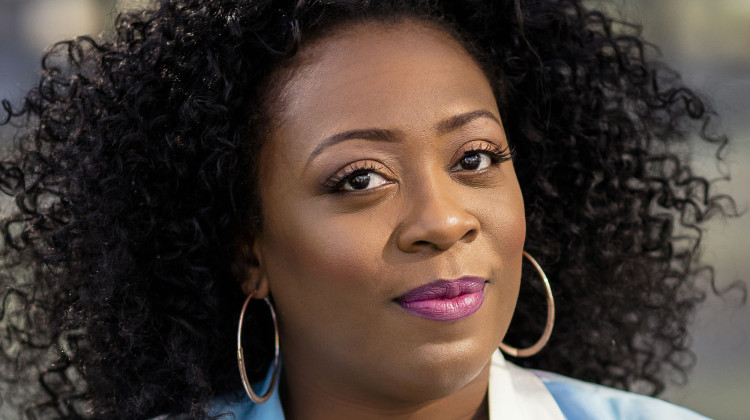
Indianapolis actress Cherish Love portrays Rosetta Tharpe, who is known as the "godmother of rock and roll," in the IRT's produciton of "Marie and Rosetta."
Cherish LoveA new production at the Indiana Repertory Theatre focuses on the life of Sister Rosetta Tharpe — a trailblazing gospel singer and guitarist often hailed as the “Godmother of Rock and Roll.” The play, titled “Marie and Rosetta,” will appear on the IRT’s stage throughout November.
WFYI’s Kyle Long attended a rehearsal, where he spoke with actor Cherish Love, who portrays Rosetta Tharpe.
This interview has been edited for style and clarity.
Long: Before we talk about your work in this production, I wanted to give our listeners some information about your background. From what I know you grew up in Texas. Is that right?
Love: Yes, Dallas, Texas, born and raised. I've been singing and playing the piano since I was seven years old. I come from a very musical background. Both of my parents are pastors. My brother actually went to the musical theater genre, and I kind of followed along as a music director. But then the acting bug kind of bit me. It bit me real good. So I was like, 'I think I like it here.'
Long: I'm curious about your approach to portraying Sister Rosetta Tharpe; this is an artist that had such a distinct and unique style as a performer. How do you capture that essence of her, but make this unique to yourself as an artist?
Love: I dove right in. I looked at documentaries from her; I looked at performances from her, everything I could get my hands on. I wanted to tell this story, because history, black history, it always can get erased, you know? It could be swept away really, really quickly if you're not careful. And I didn't want that. I also didn't want to be like, ‘I'm going to pretend to be her.’ I wanted to really give this woman life that she deserved and breathe into this piece and really respect her, really honor her. So I dove right in, and anything that I could get my hands on with Rosetta, I was in it.
Long: Cherish, you mentioned the erasure of black history. In her lifetime, Sister Rosetta Tharpe was a star. She toured across the country, across Europe, to huge audiences in the late 20th century. Her legacy kind of went into decline, and a lot of that history, for whatever reason, was erased or forgotten. In the 21st Century, there's been this massive surge of interest in her work. Do you have any thoughts on why this generation here now is so touched by her art and why it still speaks so much to us today?
Love: I think it's the empathy. We're living in a world where there’s a real information age, and people are going back to the beginning, back to the basics, because information is at their fingertips. And these are people who really want to give credit where credit is due. We're being told that there are many artists that are saying, “Hey, look back into the past.”
There's a bird in the African diaspora called the Sankofa bird. It walks forward, but it looks back. I think that's where we are as a world. We are walking into something new, but we can look back and see we still got a lot to do, and I think that's what Rosetta did. She held the past, the future, the present in her hand as she strummed along that guitar.
This interview originally aired on WFYI’s Cultural Manifesto.
 DONATE
DONATE






 Support WFYI. We can't do it without you.
Support WFYI. We can't do it without you.